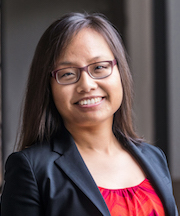ACR 2021 Riyue Bao Abstract and Biography

Abstract
A personalized multi-omics approach to decipher resistance to cancer immunotherapy
Immunotherapy is one of the major treatments for patients diagnosed with cancer. However, on average less than half of the patients showed clinical benefit. Known biomarkers of response include a T cell-inflamed tumor phenotype characterized by CD8+ T cells and type I/II interferon expression, and a high tumor mutational burden. To identify tumor-intrinsic oncogenic pathways that drive immune exclusion, we performed an integrated multi-omic analysis of human cancer, including 11,607 tumors across multiple databases and cohorts treated with anti-PD1.
The study was executed on the HPC infrastructure provided by the University of Pittsburgh’s Center for Research Computing. Hundreds of sequencing files were processed at scale, converting terabytes of raw genomic data into interpretable results. To quantify oncogenic mediators of immune exclusion in each patient, we developed a scoring system consisting of somatic mutations, transcriptional programs and relevant proteome for different immune phenotypes. We demonstrated an increasing number of co-activated pathways leads to more highly non-T cell-inflamed tumors. Furthermore, we interrogated tumor cell-derived modulation of T cell infiltration by single-cell RNAseq and nanostring digital spatial profiling technologies. Our work provides a personalized multi-omics approach to detect mechanisms that may contribute to resistance to cancer immunotherapy based on individual patient’s unique genetic background. Strategies to target pathways associated with non-T cell inflamed tumors are being pursued as potential immune-potentiating interventions, including a novel combination clinical trial that we recently launched for patients with IDH1 mutant tumors.
Biography
Dr. Bao is an associate professor of medicine at the University of Pittsburgh.. Dr. Bao is a member of the Hillman Cancer Center (HCC) Cancer Biology Program and Co-Director of the UPMC HCC Cancer Bioinformatics. Using a combination of multi-omics data integration, machine learning, and computer vision-assisted pathology image recognition, Dr. Bao’s work bridges methodological advances and biomedical applications with a direct impact on accelerating the knowledge discovery to new clinical trials that could benefit patients. Her lab focuses on the data-driven discovery of resistance mechanisms to cancer immunotherapy, with major contributions to the identification of WNT/β-catenin activation as the first tumor-intrinsic mechanism that drives immune exclusion, commensal microbiome as the modulator of anti-PD1 efficacy, and systemic discovery of oncogenic pathways that contribute to the absence of immune infiltration across human solid tumors. Those findings are of particular importance because they provide the scientific rationale to new trials that combine therapeutic targets, such as IDH1 inhibitors, with anti-PD1. Dr. Bao is Co-Leader of Bioinformatics/Biostatistics in the Melanoma and Skin Cancer SPORE program. She also serves as the Ad-Hoc member of the UPMC HCC Data Science Strategy Committee, providing critical advice on data accessibility, analysis, integration, and infrastructure for translational research across the Cancer Center.

